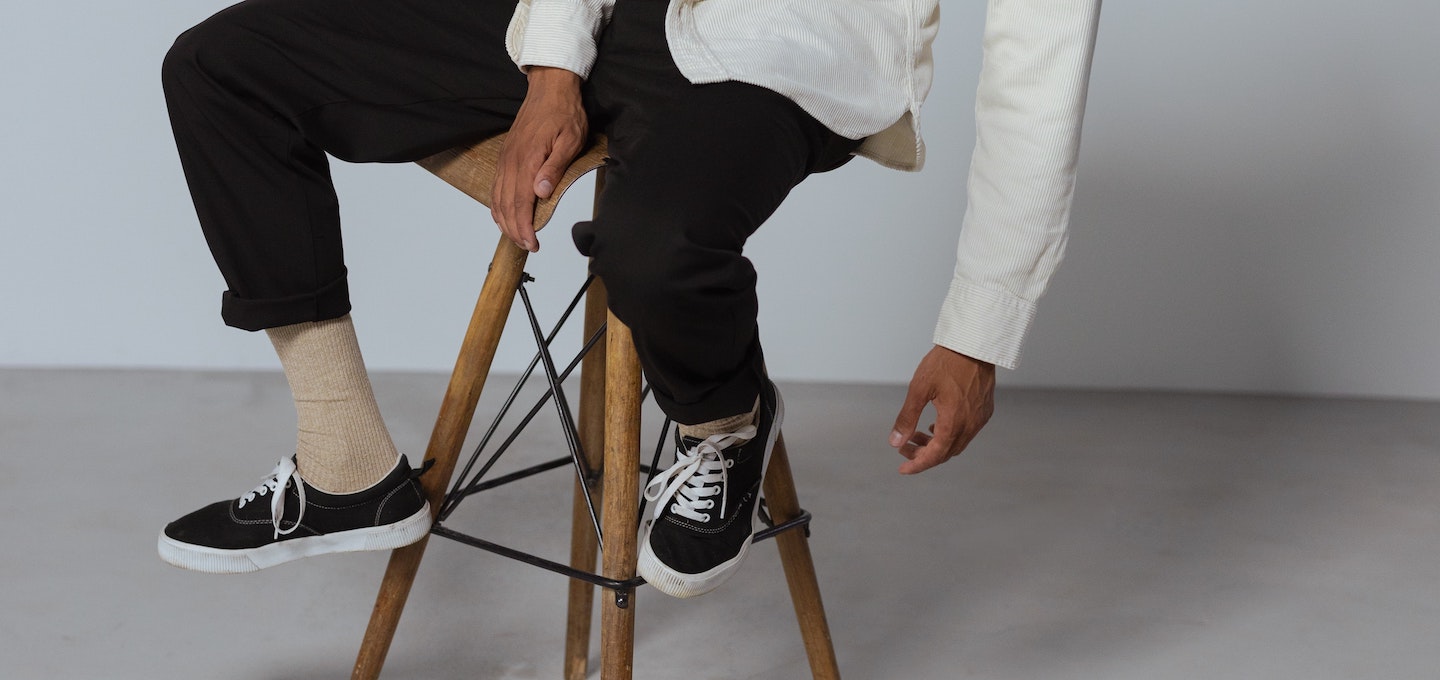The normcore aesthetic, a term that has woven its way into the fabric of contemporary fashion discourse, represents a paradoxical blend of ordinariness and deliberate styling. This fashion phenomenon, known as normcore fashion, swaps the flashy and flamboyant in favor of simplicity and comfort.
By embracing this aesthetic, individuals make a statement through understatement, finding elegance in the everyday. Normcore fashion is not just about the clothes you wear but about adopting an attitude that values authenticity and approachability above all.
In this exploration of normcore fashion, we dive into its origins, key components, and how it has subtly redefined what it means to be fashionable in a world saturated with endless choices and fleeting trends.
Key Takeaways
Normcore fashion champions simplicity, embracing everyday items as the core of one’s wardrobe. It’s about blending in yet standing out. This aesthetic promotes comfort, functionality, and a nod to the ’90s minimalism, making it a timeless choice for the fashion-forward man.
It doesn’t hurt that normcore, by definition, is a pretty simple style to adopt. It’s not just about the clothes, though; the crux of the normcore aesthetic is its philosophy towards fashion.

What Is the Normcore Aesthetic?
At its heart, normcore is a rebellion against the excesses of fashion, a move towards a more inclusive, accessible aesthetic. It’s fashion that refuses to be fashion, focusing on simplicity, anonymity, and sameness.
Normcore wearers find beauty in the mundane, wearing generic, often unbranded clothing that proudly lacks the traditional status markers. It’s within this simplicity that lies a profound statement on individuality and the rejection of the fast-paced fashion industry.
It’s about finding one’s style by not adhering to one, embracing basics like jeans, tees, and sneakers for their comfort and universality. Is it basic? Sure. But it’s intentional.

The Evolution of Normcore Style
The Origins of Normcore
The term ‘normcore’ first emerged in 2008 in a comic by Ryan Estrada but it really hit the mainstream thanks to a 2013 report by K-Hole, a New York-based trend forecasting collective, which described it as a unisex fashion trend characterized by average-looking clothing.
When Ryan Estrada first spoke about it, it was in a comic. The comic depicted a city besieged by individuals from bizarre subcultures, culminating in the introduction of normcore as the ultimate subculture.
This group, characterized by their jeans-and-T-shirt attire, was humorously portrayed as always catching on to trends three years too late.
In a 2014 Medium article titled “I’m sorry, I accidentally invented Normcore,” Estrada reflected on his unintentional contribution to the normcore narrative, providing a prelude to the term’s later adoption by the fashion industry.
K-Hole’s interpretation of normcore, however, expanded the concept, positioning it as a deliberate stance against the excessive individualism promoted by digital culture.
Embracing sameness and simplicity became a new form of cool, challenging the traditional fashion ethos and encouraging a collective, blend-in approach to standing out.
The ’90s: A Decade of Influence
Normcore’s aesthetic roots are deeply embedded in the ’90s, drawing inspiration from the decade’s approach to fashion that emphasized comfort, functionality, and an understated cool. This era, devoid of today’s digital scrutiny, celebrated the ordinary and the accessible.
Television shows like “Seinfeld” unwittingly showcased normcore fashion, with characters donning plain sneakers, dad jeans, and nondescript jackets. Think peak thrift store fit.
Public figures such as Steve Jobs became unintentional normcore icons, with Jobs’ black turtleneck, denim jeans, and New Balance sneakers ensemble becoming a signature look. The ’90s laid the foundation for normcore, emphasizing that style doesn’t have to shout to be heard.
Mainstream Adoption and Evolution of Normcore
As normcore evolved, it moved from a niche concept into a mainstream fashion trend. By the mid-2010s, it was being celebrated in fashion magazines and by street-style stars, marking a shift in how fashion was perceived.
High fashion brands and designers began incorporating normcore elements into their collections, elevating basic pieces to luxury items. This paradoxical move highlighted the fluid nature of fashion trends and how they can transform ordinary items into coveted pieces.
The evolution of normcore also saw the trend being adopted globally, transcending its Western origins to influence fashion in diverse cultures and adapting to local contexts while maintaining its core values of simplicity and universality.
The Role of Social Media and Celebrity Influence
Social media played a crucial role in normcore’s proliferation, with platforms like Instagram and Pinterest becoming showcases for normcore style. Celebrities and influencers adopting the trend helped further its reach and appeal.
Figures like Kanye West and Ryan Gosling were seen embracing elements of normcore fashion, demonstrating its versatility and widespread acceptance. Sure, maybe they truly were trying to blend in, but let’s give them the benefit of the doubt.
This celebrity endorsement not only popularized the trend but also highlighted its inherent contradiction: the pursuit of individuality through the deliberate choice of blending in.
Normcore in the 2020s
Entering the 2020s, normcore continues to evolve, reflecting broader societal shifts towards sustainability, minimalism, and authenticity. The pandemic era, emphasizing comfort and practicality, has further cemented normcore’s relevance. Capsule wardrobe, anyone?
As people worldwide reassessed their priorities, the appeal of unpretentious, versatile clothing that normcore embodies became more pronounced. Today, normcore is not just a fashion statement but a lifestyle choice, advocating for a more thoughtful, sustainable approach to consumption and identity.

Key Components of the Normcore Aesthetic for Men
The Quintessential White T-Shirt
The white T-shirt stands as the epitome of normcore’s embrace of simplicity. Its journey from undergarment to fashion staple is a testament to its versatility and universal appeal.
The white T-shirt gained iconic status in the mid-20th century, thanks to cultural icons like James Dean and Marlon Brando, who wore it with an effortless cool that defied the conventions of their time.
Today, it is a blank canvas in the normcore wardrobe, symbolizing purity and simplicity. Its significance lies not just in its aesthetic appeal but in its ability to be both a standalone piece and a layering item, making it indispensable in the normcore aesthetic.
Denim Jeans: The Uniform of the People
Jeans have a rich history that aligns perfectly with the normcore ethos of functionality and durability. Originally designed for miners in the late 19th century, jeans were popularized by Levi Strauss & Co., becoming a symbol of rugged American workwear.
Through the decades, jeans transcended their workwear origins to become a fashion item, embraced by rebels, rock stars, and, eventually, everyone. In the context of normcore, jeans represent the democratization of fashion — a versatile, gender-neutral item that swapped trends in favor of timeless appeal.
The preference for straight-leg, unembellished jeans in the normcore wardrobe underscores a return to basics, celebrating the garment’s utilitarian roots.
Sneakers: From Athletic to Iconic
The transformation of sneakers from purely athletic equipment to fashion staples mirrors the normcore appreciation for comfort and functionality. Brands like New Balance, Adidas, and
The adoption of sneakers by normcore enthusiasts reflects a broader shift towards casual, practical footwear in fashion. Sneakers embody the normcore principle of blending in, with their design evolving to suit various occasions, further cementing their status as a versatile, everyday choice.
Outerwear: Fleece and Windbreakers
Fleece jackets and windbreakers are central to the normcore aesthetic in cooler climates, admired for their practicality and nondescript appearance. These pieces of outerwear, often associated with outdoor activities and suburban dad attire, have been reclaimed by normcore as icons of anti-fashion.
Fleece, with its insulating properties and comfort, and windbreakers, with their lightweight, weather-resistant materials, exemplify the normcore pursuit of items that serve a purpose beyond mere aesthetics.
Their inclusion in high fashion collections and street style looks signifies a blurring of the lines between functional clothing and fashion, a hallmark of the normcore philosophy.
Accessories: The Subtle Art of Accentuation
It will come as no surprise that flashy accessories aren’t found in the normcore aesthetic; however, items like simple canvas tote bags, understated caps, and minimalist watches (insert Casio calculator watch here) are embraced for their functionality and lack of pretense.
These accessories complement the normcore aesthetic by adding practicality and a touch of personality without overshadowing the outfit’s simplicity.
The choice of accessories in normcore fashion is deliberate, focusing on utility and durability over ornamentation, aligning with the movement’s ethos of valuing substance over style.
Each component of the normcore look for men is a testament to the movement’s core principles: simplicity, functionality, and a conscious rejection of the mainstream nature of trends.
Normcore fashion champions a more sustainable, thoughtful approach to personal style, prioritizing individual comfort and authenticity over conformity to fleeting fashion dictates by focusing on timeless pieces that embody durability and versatility.

Normcore Hairstyles & Grooming Trends
Normcore’s approach to hairstyles and grooming is much like its approach to clothing: understated, unpretentious, and strikingly normal. This aesthetic eschews meticulously styled and overly groomed looks in favor of more natural, easy-to-maintain hairstyles that reflect an effortless, laid-back attitude.
The hallmark of normcore hair is simplicity and functionality, aligning with the movement’s overall ethos of championing beauty in everyday normality.
Men’s Normcore Hairstyles
The typical normcore hairstyle is characterized by its low maintenance and practicality. Buzz cuts, crew cuts, and simple, short back and sides are popular choices, offering a clean, timeless look that transcends fleeting fashion trends.
Longer hairstyles are also embraced within the normcore vibe, provided they appear natural and unstyled, often worn loosely or tucked behind the ears. The key is in the hair’s natural texture and movement, allowing for a look that’s both versatile and unassuming.
Normcore Facialhair: The Less-is-More Approach
In terms of facial hair, the normcore grooming trend leans towards a more natural look. Full beards, when well-maintained but not overly sculpted, stubble, or a clean-shaven face, all fit within the normcore grooming philosophy.
The emphasis is on looking well-groomed without appearing to have invested excessive time or effort into one’s appearance.
This straightforward approach to hairstyles and grooming is not just a fashion statement but a reflection of normcore’s broader societal commentary. It’s a rejection of the pressure to constantly innovate one’s appearance, proposing instead a return to basics and a focus on comfort and self-acceptance.
This trend really showcases the movement’s call for a more genuine connection with one’s identity, beyond the external pressures of fashion and trends.

Men’s Normcore Fashion Icons
The normcore look, though emphasizing the generic and the unpretentious, has been personified by several public figures who embody the movement’s ethos through their personal style. These individuals highlight how normcore fashion can be both a personal choice and a broader cultural statement.
Steve Jobs: The Quintessential Normcore Icon
Steve Jobs is often cited as an unintentional pioneer of the normcore fashion movement. His signature look of a black turtleneck, blue jeans, and New Balance sneakers became an emblem of his minimalist approach to fashion.
Jobs’ consistent wardrobe was not just a personal preference but a reflection of his broader philosophy towards life and work: simplicity, efficiency, and a focus on substance over style.
Jerry Seinfeld: Normcore Before It Was Normcore
Jerry Seinfeld’s wardrobe on the hit ’90s sitcom “Seinfeld” is a treasure trove of normcore staples. His penchant for dad jeans, simple sneakers, and nondescript shirts exemplifies the normcore vibe before it was officially recognized as a fashion trend.
Seinfeld’s on-screen attire, reflective of the everyday man’s wardrobe of the time, highlights the normcore principles of relatability and comfort.
The Understated Influence of Celebrities
Although normcore champions the idea of blending in, several celebrities have managed to stand out while embracing its tenets. Actors like Ryan Gosling and musicians like Kanye West have been spotted in outfits that resonate with the normcore philosophy.
Their choices often include basic tees, hoodies, and sneakers, showcasing how normcore elements can be integrated into the wardrobe of those in the public eye, further cementing the trend’s place in contemporary fashion.

Normcore Outfits for Men: How to Wear the Normcore Aesthetic
Adopting the normcore aesthetic involves a shift towards embracing simplicity and prioritizing comfort without sacrificing style. The ideal normcore outfit for men is deceptively simple yet thoughtfully composed, focusing on quality and fit over brand names and trends.
A perfect example would be pairing a well-fitted, plain white T-shirt with classic, straight-leg denim jeans and a pair of clean, unbranded sneakers. The outfit might be completed with a simple, utilitarian jacket or an unassuming sweater, depending on the weather.
The goal is to look put-together and approachable, achieving a balance between being dressed down and maintaining a sense of intentionality in one’s appearance.
Final Verdict
Normcore, emphasizing simplicity, comfort, and authenticity, offers a refreshing counterpoint to the fast-paced, trend-driven fashion world. It champions the beauty of the ordinary, encouraging a more thoughtful and sustainable approach to personal style.
As we move forward, normcore principles will likely continue influencing not just how we dress but how we perceive fashion’s role in our lives. This will highlight the value of individuality, not through conspicuous consumption but through a conscious return to basics.
FAQ
-
-
Normcore is a fashion aesthetic that embraces simplicity and everyday items. It focuses on comfort, functionality, and blending in rather than standing out. It is characterized by unpretentious, often unbranded clothing that champions the ordinary.
-
The main difference lies in the intention behind the fashion choices: normcore aims for anonymity and simplicity, embracing mainstream comfort and functionality, while hipster style seeks uniqueness and often incorporates vintage, indie, or ironic elements to stand out.
-
Minimalism in fashion focuses on simplicity, clean lines, and a limited color palette, emphasizing the quality and design of each piece. Normcore, while also valuing simplicity, leans more towards everyday, functional clothing without the emphasis on design or high fashion.
-
To dress normcore, focus on basic, functional pieces like plain T-shirts, jeans, and sneakers. Choose comfortable, unbranded items that are versatile and understated, aiming for a look that feels both timeless and effortlessly casual.
-



